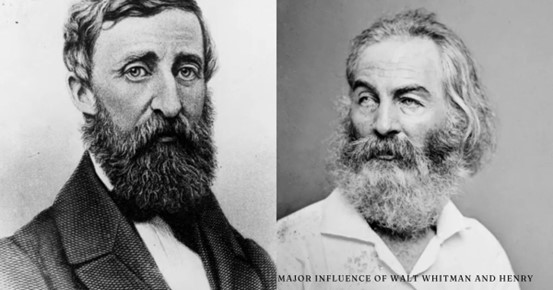The impact of 19th-century American literature cannot be discussed without acknowledging two of its most towering figures—Walt Whitman and Henry David Thoreau. These literary giants revolutionized not just the art of writing but also the intellectual and philosophical currents of their time. The “major influence of Walt Whitman and Henry” extends beyond mere literary circles; it permeates modern notions of individualism, nature, democracy, and civil rights.
This article will explore the profound influence of both authors, focusing on their works, ideologies, and the enduring impact they’ve had on literature, philosophy, and social activism. Through this exploration, we will gain insight into how Whitman and Thoreau continue to inspire generations of readers, writers, and thinkers.
Walt Whitman: The Voice of the Common Man
Walt Whitman (1819-1892) is often called “the father of free verse,” and his literary legacy is characterized by his bold, expansive style. Whitman sought to capture the spirit of democracy and individualism in his work, qualities that became central to the development of American identity.
Leaves of Grass – A Revolution in Poetry
Whitman’s seminal work, Leaves of Grass, is one of the most important collections of poetry in American literature. First published in 1855, it evolved throughout his lifetime, growing from 12 poems in its initial edition to over 400 in its final version. Leaves of Grass was revolutionary not only for its free verse but also for its unabashed celebration of the individual, the body, and the nation.
Whitman’s free-form poetry was a departure from the rigid structures of European verse, and this literary innovation mirrored his vision of America as a land of endless possibility. His poems like “Song of Myself” and “I Sing the Body Electric” explore themes of democracy, nature, love, and the self in ways that were previously uncharted in American literature.
Democratic Ideals and Individualism
Whitman was deeply influenced by the democratic ideals of the American Revolution and the idea that every individual had intrinsic worth. He saw America as a vast, diverse nation, where every citizen had a role in shaping the country’s future. His poetry reflects this democratic ethos, celebrating the individual as an integral part of the larger whole.
In “Song of Myself,” Whitman writes:
“I celebrate myself, and sing myself,
And what I assume you shall assume,
For every atom belonging to me as good belongs to you.”
These lines encapsulate Whitman’s belief in the interconnectedness of humanity and the importance of the self in the democratic fabric of America.
Henry David Thoreau: Nature and Civil Disobedience
Henry David Thoreau (1817-1862), a contemporary of Whitman, exerted his influence through both his writing and his activism. Known for his deep connection to nature and his advocacy for individual conscience over government mandates, Thoreau’s legacy is as a philosopher, naturalist, and social reformer.
Walden – A Manifesto for Simple Living
Thoreau’s most famous work, Walden, is a reflection on simple living in natural surroundings. Published in 1854, the book chronicles Thoreau’s two-year experiment of living alone in a cabin near Walden Pond in Massachusetts. Walden is more than just a recounting of a solitary existence; it is a philosophical treatise on the virtues of simplicity, self-reliance, and nature’s restorative power.
Thoreau believed that society was becoming increasingly materialistic and that people were losing their connection to the natural world. His time at Walden Pond allowed him to strip away the distractions of modern life and focus on personal reflection, something he believed was essential for true happiness and fulfillment.
“I went to the woods because I wished to live deliberately, to front only the essential facts of life, and see if I could not learn what it had to teach, and not, when I came to die, discover that I had not lived.”
— Walden
These words echo Thoreau’s belief in the necessity of living authentically, in harmony with nature, and rejecting the artificial constructs of society.
Civil Disobedience – A Call for Moral Integrity
While Walden remains a cornerstone of environmental literature, Thoreau’s essay Civil Disobedience has had an equally significant impact on political thought. Written after Thoreau spent a night in jail for refusing to pay taxes that supported the Mexican-American War and slavery, the essay advocates for nonviolent resistance to unjust laws.
Thoreau’s ideas on civil disobedience would later influence major figures like Mahatma Gandhi and Martin Luther King Jr., demonstrating how the “major influence of Walt Whitman and Henry” extended beyond literature and into social and political activism.
“Under a government which imprisons any unjustly, the true place for a just man is also a prison.”
— Civil Disobedience
Thoreau’s insistence on individual moral responsibility in the face of injustice continues to resonate with activists around the world.
Comparing the Influence of Walt Whitman and Henry David Thoreau
Whitman and Thoreau were contemporaries, and though they shared a passion for individualism and self-reliance, their approaches were different. Whitman’s vision of the individual was expansive, embracing the collective spirit of humanity. His poetry focused on the power of the individual to shape the destiny of the nation. Thoreau, on the other hand, was more concerned with individual conscience and the relationship between man and nature.
Influence on Literature
The literary influence of both men is incalculable. Whitman’s free verse revolutionized American poetry, and his celebration of the body, sexuality, and individuality paved the way for future poets to explore these themes more openly. Thoreau’s work, particularly Walden, became a foundational text for the environmental movement, influencing writers like John Muir and Rachel Carson.
Influence on Social and Political Thought
Both men also had a profound impact on social and political movements. Whitman’s inclusive vision of America, where every individual—regardless of race, class, or gender—has inherent value, resonates in modern discussions of civil rights and equality. Thoreau’s ideas on civil disobedience continue to inspire those fighting against oppressive systems, from Gandhi’s struggle for Indian independence to the American civil rights movement led by Martin Luther King Jr.
Comparing Whitman and Thoreau’s Influence
| Aspect | Walt Whitman | Henry David Thoreau |
| Key Work | Leaves of Grass | Walden, Civil Disobedience |
| Primary Themes | Democracy, Individualism, Nature | Simplicity, Self-reliance, Civil Rights |
| Literary Contribution | Father of Free Verse | Naturalist, Essayist |
| Philosophical Impact | Emphasized collective human experience | Advocated for moral resistance to unjust laws |
| Influence on Activism | Inspired civil rights movements indirectly | Directly influenced figures like Gandhi & MLK |
| Environmental Legacy | Celebrated nature’s beauty | Laid groundwork for modern environmentalism |
Conclusion: Major Influence of Walt Whitman and Henry David
The “Major Influence of Walt Whitman and Henry David” continues to shape not only literature but also the broader intellectual and social landscape. Whitman’s poetic innovations and Thoreau’s philosophical treatises on nature and civil disobedience have left an indelible mark on American culture. Together, these two figures helped forge a distinct American voice, one that celebrates the power of the individual, the beauty of nature, and the importance of moral integrity. Their works remain as relevant today as they were in the 19th century, inspiring readers and activists alike to reflect on their place in society and the natural world.
By understanding the contributions of Whitman and Thoreau, we can better appreciate the enduring legacy of their works and the ways they continue to influence modern thought and action.
FAQs About Major Influence of Walt Whitman and Henry David
What is the major influence of Walt Whitman on American literature?
Walt Whitman revolutionized American poetry by introducing free verse and exploring themes of democracy, individualism, and the interconnectedness of humanity. His work broke away from traditional poetic forms, opening up new possibilities for expression.
How did Henry David Thoreau influence social activism?
Henry David Thoreau’s essay Civil Disobedience has had a profound influence on social activism, advocating for nonviolent resistance to unjust laws. His ideas inspired leaders like Mahatma Gandhi and Martin Luther King Jr. in their respective movements for justice.
How did Walt Whitman and Henry Thoreau differ in their views on individualism?
While both celebrated individualism, Whitman’s vision was more expansive, focusing on the collective power of individuals within a democratic society. Thoreau, on the other hand, emphasized personal conscience and the importance of living a simple, authentic life, often in isolation from societal distractions.
What are some of the key themes in Walden?
Walden explores themes of simplicity, self-reliance, nature, and the importance of living deliberately. Thoreau reflects on his time living in the woods and the lessons he learned from embracing a minimalist lifestyle.
Why is Leaves of Grass considered revolutionary?
Leaves of Grass is revolutionary because it introduced free verse, rejected traditional poetic forms, and celebrated topics such as sexuality, the body, and the individual’s connection to the broader human experience, all of which were unconventional at the time.










